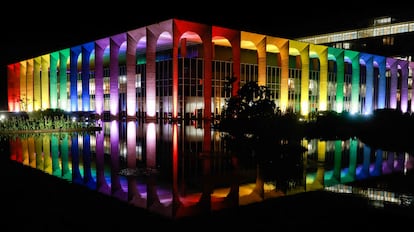Brazilian minister proposes government hiring quotas for transgender and Indigenous people
The measure seeks a legal framework for reserving 4% of its 900 labor inspector positions for specific minorities


Brazil implemented university admission quotas for poor and Black students a decade ago, transforming the lives of hundreds of thousands of families seeking a better future. Minister of Labor and Employment Luiz Marinho has now announced his intent to create specific hiring quotas for transgender (2%) and Indigenous people (2%). He also wants to increase the positions for Black and mixed-race Brazilians to 45%, and 6% for people with disabilities. The initiative is a response to the widespread public resistance to adding 900 government jobs for labor inspectors. Marinho’s ministry is actively investigating the legal means to translate this political goal into concrete action.
Marinho’s announcement came just a few hours after International LGBTQ+ Pride Day was celebrated in Brazil and shortly before the US Supreme Court decided to end affirmative action in universities. Like President Luiz Inácio Lula da Silva, Marinho belongs to Brazil’s Workers’ Party, but it’s not clear whether the president and others in his administration support the proposal to increase quotas for public sector employment. The ministry confirmed the initiative to EL PAÍS, but the minister himself has yet to respond to our questions.
Brazil’s announcement and the court ruling in the United States may reignite the debate about quotas. In 2012, Brazil implemented quotas to expand opportunities for disadvantaged students. The multi-layered system positively discriminates in favor of low-income, mixed-race and Black public school students, in that order. Students in more than one category have a better chance of obtaining a quota-reserved position. The measure struck a nerve with White families a decade ago, but the controversy subsided over time. Nevertheless, on an individual basis, the quota system has been a remarkable stride towards narrowing the gap of inequality among students.
In a country where Black and mixed-race people make up 56% of the population, these groups now constitute the majority of students in public universities. Hundreds of thousands of families have also been transformed by having a college graduate in the family, paving the way for greater prosperity.
Quotas for transgender individuals are likely to intensify the ongoing animus between a government that champions diversity and a reactionary right-wing movement led by Jair Bolsonaro. Like leaders in other parts of the world, Bolsonaro has deliberately focused on undermining LGBTQ+ rights, especially trans rights, his primary arena for confronting progressive ideals. Several of Brazil’s prominent government buildings, including the National Congress and the Ministry of Foreign Affairs’ Itamaraty Palace, embraced the spirit of International LGBTQ+ Pride Day by illuminating their facades with a vibrant array of multicolored lights.
The issue of quotas in government procurement and hiring is especially sensitive because Lula’s administration has announced several public bids for government jobs since taking office six months ago, including hundreds of positions for labor and environmental inspectors. The government expects these new hires to contribute significantly to the battle against modern slave-labor practices and deforestation of the Amazon rainforest.
The most populous country in Latin America has experienced significant and visible progress in transgender rights. Four transgender women won public office in the recent elections – two in the National Congress and one each in the Rio de Janeiro and Sergipe state legislatures. Some private companies are also starting to show interest in hiring transgender employees as part of their diversity plans. However, transgender individuals in Brazil continue to face daunting hurdles when seeking employment or simply adapting to the natural process of aging – their life expectancy is well below that of their fellow citizens. Tragically, Brazil maintains its unenviable position as the most perilous country for this marginalized community. An alarming Trans Murder Monitoring report, compiled by an international network of NGOs, documented the murder of 96 transgender people in Brazil between October 2021 and 2022.
Sign up for our weekly newsletter to get more English-language news coverage from EL PAÍS USA Edition
Tu suscripción se está usando en otro dispositivo
¿Quieres añadir otro usuario a tu suscripción?
Si continúas leyendo en este dispositivo, no se podrá leer en el otro.
FlechaTu suscripción se está usando en otro dispositivo y solo puedes acceder a EL PAÍS desde un dispositivo a la vez.
Si quieres compartir tu cuenta, cambia tu suscripción a la modalidad Premium, así podrás añadir otro usuario. Cada uno accederá con su propia cuenta de email, lo que os permitirá personalizar vuestra experiencia en EL PAÍS.
¿Tienes una suscripción de empresa? Accede aquí para contratar más cuentas.
En el caso de no saber quién está usando tu cuenta, te recomendamos cambiar tu contraseña aquí.
Si decides continuar compartiendo tu cuenta, este mensaje se mostrará en tu dispositivo y en el de la otra persona que está usando tu cuenta de forma indefinida, afectando a tu experiencia de lectura. Puedes consultar aquí los términos y condiciones de la suscripción digital.








































